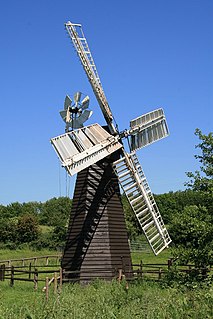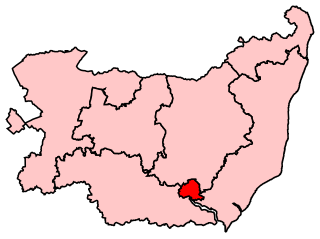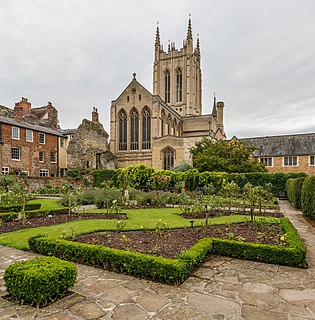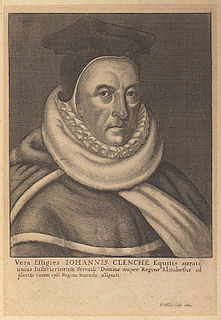Related Research Articles

Suffolk is a ceremonial county of England in East Anglia. It borders Norfolk to the north, Cambridgeshire to the west and Essex to the south; the North Sea lies to the east. The county town is Ipswich; other important towns include Lowestoft, Bury St Edmunds, Newmarket, and Felixstowe which has one of the largest container ports in Europe.

Stowmarket is a market town in Suffolk, England, on the busy A14 trunk road between Bury St Edmunds to the west and Ipswich to the southeast. The town is on the main railway line between London and Norwich, and lies on the River Gipping, which is joined by its tributary, the River Rat, to the south of the town.

Ipswich is a constituency represented in the House of Commons of the UK Parliament since December 2019 by Tom Hunt of the Conservative Party.

The Eastern Union Railway (EUR) was an English railway company, at first built from Colchester to Ipswich; it opened in 1846. It was proposed when the earlier Eastern Counties Railway failed to make its promised line from Colchester to Norwich. The businessman John Chevallier Cobbold and the engineer Peter Bruff were prominent in launching the company. The allied but nominally independent Ipswich and Bury Railway built a line onwards to Bury St Edmunds, also opening in 1846, and soon amalgamated with the EUR.

St Edmundsbury Cathedral is the cathedral for the Church of England's Diocese of St Edmundsbury and Ipswich. It is the seat of the Bishop of St Edmundsbury and Ipswich and is in Bury St Edmunds in Suffolk. Originating in the 11th century, it was rebuilt in the 12th and 16th centuries as a parish church and became a cathedral in 1914; it has been considerably enlarged in recent decades.

Sir Clement Higham, or Heigham, of Barrow, Suffolk, was an English lawyer and politician, a Speaker of the House of Commons in 1554, and Chief Baron of the Exchequer in 1558–1559. A loyal Roman Catholic, he held various offices and commissions under Queen Mary, and was knighted in 1555 by King Philip, but withdrew from politics after the succession of Queen Elizabeth I in 1558.

Sir John Fortescue of Salden Manor, near Mursley, Buckinghamshire, was the seventh Chancellor of the Exchequer of England, serving from 1589 until 1603.

Colonel William Wollaston was a British M.P. for Ipswich between 1768 and 1784.

Suffolk was a constituency of the European Parliament located in the United Kingdom, electing one Member of the European Parliament by the first-past-the-post electoral system. Created in 1979 for the first elections to the European Parliament, it was abolished in 1994 and succeeded by the constituencies of Suffolk and South West Norfolk, Essex North and Suffolk South and Cambridgeshire.
Churchman's was a British cigarette manufacturer based in Ipswich, Suffolk. The company was a subsidiary of John Player & Sons of Imperial Tobacco Co. Churchman was notable for producing one million cigarettes a day.
This is a list of Sheriffs and High Sheriffs of Suffolk.

Benjamin Lany was an English academic and bishop.
This is a list of members of the 2nd Legislative Assembly of Queensland from 1863 to 1867, as elected at the 1863 colonial elections held between 30 May 1863 and 27 June 1863.

John Clench was an English judge, a Serjeant-at-Law, Baron of the Exchequer and Justice of the Queen's Bench, of the late Tudor period. He established his family in south-east Suffolk, in the neighbourhood of Ipswich, where for many years he was the Town Recorder.
Robert Hopton (c.1575-1638) was an English landowner and politician who sat in the House of Commons in two parliaments between 1604 and 1622.

Edmund Withypoll, Esquire, of London, of Walthamstow, Essex, and of Ipswich, Suffolk, was an English merchant, money-lender, landowner, sheriff and politician, who established his family in his mother's native county of Suffolk, and built Christchurch Mansion, a distinguished surviving Tudor house, as his Ipswich home.
SirBassingbourne Gawdy, of West Harling, Norfolk, was an English lawyer and judge, knight, and Member of Parliament.
Sir Arthur Hopton, of Witham, Somerset, was an English politician. He was member of parliament for Dunwich in 1571, and for Suffolk in 1589. He was made a Knight of the Bath at the coronation of King James I.
Robert Snelling was one of the two MPs for Ipswich in a number of English parliaments between 1614 and 1626.
William Blois, or Deye, was one of the two MPs for Ipswich in the English parliaments from 1661 to 1670 and Suffolk in 1654 and 1656.
References
- ↑ John. P. Ferris (2010). "DAY (DEYE), Edmund (-d.1640), of Ipswich, Suff.". In Ferris, John P.; Thrush, Andrew (eds.). The House of Commons 1604-1629. The History of Parliament Trust. Retrieved 8 November 2022.